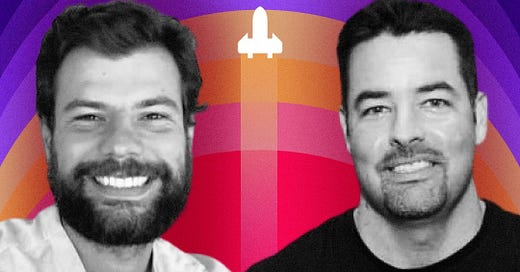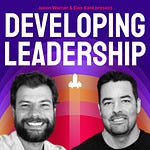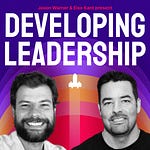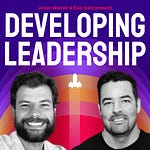Senior Director of Engineering at Datadog, Nuno Antunes, joins us to talk about a highly requested topic: Transitioning from Software Engineer to Engineering Leader.
From striking the right balance between being a people vs. process-oriented leader to the challenges of building teams in fast-growing companies, this episode is jam-packed with teachable moments, workshop approaches, and the organizational shifts we've witnessed through the years.
Here are a few of our favorite moments from the conversation
Every time someone starts the journey from an individual contributor to being a team lead, you see the same feeling of, "okay, what do I do? Where do I start? What does it mean to be a team lead?" Something that is very common is people taking either the people tour, they look at the people in the team, they want to take care of the team, they want to shield the team. It's more of a focus on happiness or motivation. And for other people, when they start leading they are looking for, "how can we deliver?" The processes and the organizational setup. Which is also important.
I think that when a portion of us talk about vulnerability, we have this expectation that because the way vulnerability looks, that it can look like therapy or something along those lines. And I don't believe that to be the case. I believe what it is is actually just showing that you're human. And you, just like everybody else, have similar human things.
I actually do believe as an industry, we are in our own Newton's Cradle. In the 80’s and 90’s, maybe even the early 2000’s, we had performance-based, almost maniacal leaders. We elevated people like Larry Ellison and Steve Jobs, and "visionaries", and I don't believe they were actually good leaders, but they "got many people on their organization to be motivated.”
But that was overly oriented to one side. And then there was a Zeitgeist that basically said: "No.” And it pulled Newton's cradle to the other side, which is we're going to talk about vulnerability in the therapy sense or only focus on culture without execution and outcome, and only focus on how you're feeling, and managers' jobs are to only make their teams safe and psychological safety. Which I think are all incredibly important elements, when they're in balance with execution.
People are more and more reflecting on their choices, what they want to do with their lives. There's a lot of people considering leaving the industry, changing jobs. There's this huge shift everywhere. We now need to be extra careful about making sure that people are not only comfortable and that they're delivering, but they also find there's a strong purpose to what they do. And seeing people leave for smaller companies, where they can have a bigger impact, work on areas like climate change. You see that more and more, which is interesting.
There are a lot of companies out there that are balancing that execution and great care for their people, going as far back as probably hundreds of years. But it's like you said, the zeitgeist of the moment is usually the polarizing ideas and I'm still always surprised the impact that the, let's call it even social media in this case, can have on shifting opinions and driving us in an industry from one side to the other. From people who x years ago would have been extremely strong believers of the GE style performance-only execution, and today are on the complete opposite side of the spectrum of “it's only about the happiness and health of my team.”
Ask for help, don't try to do it all on your own. It's a new role. So it requires new tools. You still probably don't master those tools and that's fine. You're learning something new, you need to crawl and then walk before you run. So find someone that can help you. If your manager is a great manager, a great leader. Perfect. If not, try to reach out. Mentor with some other people in your organization, outside the organization, read some books, join some communities, listen to this podcast. But don't just put it on your shoulders to make this journey on your own. It's much easier when you have someone do it with you.
💡 Topic Explainers
🛠 Newton’s Cradle of People vs. Execution
Jason uses Newton’s Cradle to illustrate the high impact of one-sided leadership (i.e., being too focused on people’s happiness or too focused on execution and results).
Ultimately, this shows how important both people and execution are, and why leaders should aim to have a balanced approach.
🛠 Psychological Safety vs Accountability
One of the core topics of this episode is the idea that leaders often struggle with balancing between being people-driven or execution-driven, especially in the early stages of stepping into leadership positions.
What we want you to understand is the impact that the environments created by these leadership styles have on teams, and ultimately, results. For this, we borrowed a handy matrix (by now you must have caught on that we love them), adapted from Amy C. Edmondson’s teaming theory in another publication, “Positive Organizational Behaviour”.
Here’s a quick refresher on Psychological Safety and Accountability:
Psychological Safety: Work methods that reduce the pressures that team members face in their teams and create a work environment that allows them to act accordingly to their beliefs.
Accountability: Being results-driven and assuming individual responsibility for one’s work delivery.
🛠 Radical Candor: Having Difficult Conversations
The best-selling book by Kim Scott has already been featured in our Topic Explainers for Episode 3 “The Art of Making Good Decisions”.
Nuno talks about the positive impact that this book had on people from his teams when conducting leadership workshops, not only on a professional but on a personal level as well.
Join the discussion and follow us on twitter @ devleadership_
Developing Leadership is powered by Athenian. We are introducing a winning approach to engineering metrics that can help you empower your teams to autonomously improve. If you want to learn more, go to athenian.com
















Share this post